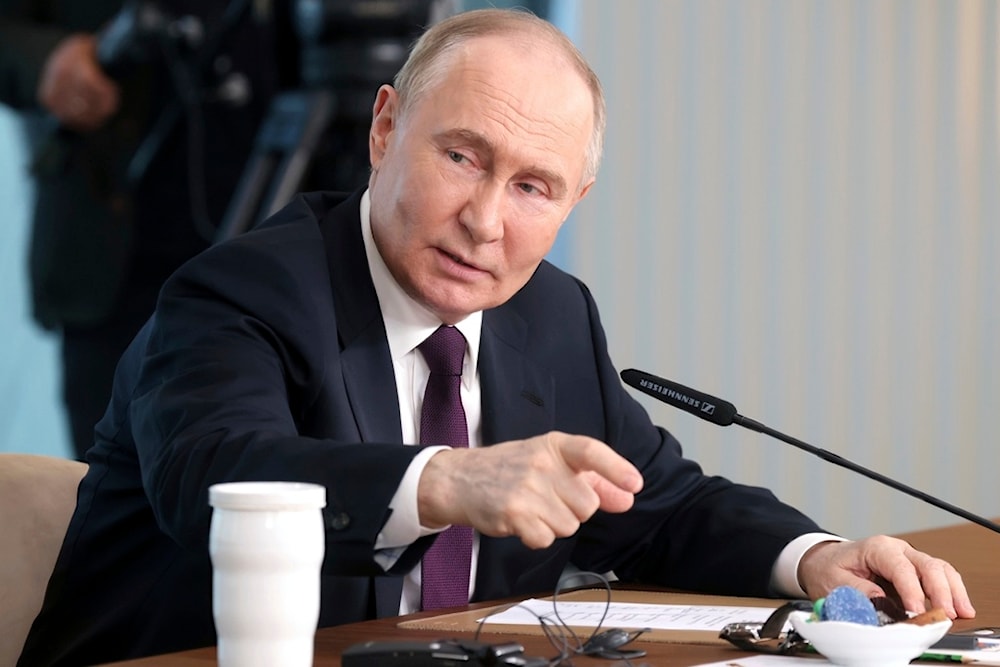Putin: US 'monopolized' peace process, Gaza war is 'total destruction'
Russian President Vladimir Putin has said that the war in the Gaza Strip does not resemble a war, but rather 'it looks like is a total destruction of the civilian population.'
-

Russian President Vladimir Putin speaks to senior news leaders of international news agencies on the sidelines of the SPIEF at the Lakhta Center skyscraper in St. Petersburg, Russia, June 5, 2024. (AP)
Russian President Vladimir Putin, on Wednesday, addressed the ongoing war in the Gaza Strip noting that it "does not look much like a war," rather, "it looks like is a total destruction of the civilian population."
This statement does not come isolated from a thread of conversation in which Putin began by noting "what is happening in Gaza now in response to that terrorist attack in Israel," adding that "we oppose terrorism in all its forms, including attacks against civilians in any place and in any country."
Moreover, Putin underscored that Washington was responsible for the escalation in the Middle East when it decided to attempt to solve the "crisis" single-handedly.
"We believe this is a result of US policy. They monopolized the peace process. They pushed aside all previously established mechanisms for collective efforts to solve this extremely difficult problem," Putin said adding that "Perhaps someone in the US administration believes that the fewer opinions are there on the issue, the easier it would be to get the results, but they were obviously wrong."
Moreover, Putin reaffirmed Moscow's commitment to the two-state solution saying "It is not possible to solve the problem with some material offerings. The real issue, political matters, need to be resolved. This involves creating two states, as foreseen in the UN’s decision to establish two states in this territory – a Palestinian state and a Jewish state."
Additionally, Putin emphasized that Moscow is relying on Turkish President Recep Tayyip Erdogan's involvement in de-escalation, acknowledging his significant influence both regionally and within the Islamic world.
In that regard, the Russian president said, "We know that President Erdogan has made vigorous efforts to solve this very urgent and longstanding issue. Considering President Erdogan's authority in the region, the world, and the Islamic world, we expect his contribution to be noticeable. For our part, taking into account our longstanding relations with Israel, we are ready to do everything Russia can to resolve this situation."
Furthermore, Russia's position on the Gaza Strip remains unaffected by political conditions and has been consistent since Soviet times. The Russian president noted that the Soviet Union recognized Palestinian statehood as early as 1988.
"We have long recognized the Palestinian state since the Soviet Union era. Our approach in this regard has not changed," said Putin.
Kiev only names the target, suppliers make the decision
Regarding the ongoing war in Ukraine, Putin has issued a stark warning regarding the supply of advanced Western weapons to Ukraine, suggesting a potential "symmetrical response" if such actions continue.
Speaking on the issue, Putin emphasized that the targeting decisions for these weapons, capable of reaching Russian territory, are not made by Kiev but by the suppliers.
Kiev only names the target, said Putin, stressing that "But they do not decide whether to strike at this target or not, because, I repeat, a flight mission is being formed, and it is only assigned by those who supply these weapons. If it's ATACMS, then the Pentagon is doing it. If Storm Shadow, then the British are doing it."
This comes after several Western countries announced their willingness either to supply Kiev with advanced weapons or to greenlight Ukrainian attacks on Russian soil using their weapons. In response to that, Putin pledged to bolster Russian air defenses and indicated that the Russian leadership is contemplating a retaliatory measure.
"If someone considers it possible to supply such weapons to a war zone to strike our territory and create problems for us, then why do we not have the right to supply our weapons of the same class to those regions of the world where attacks will be carried out on sensitive objects of those countries that do the same to Russia? The answer may be symmetrical," he warned.
SPIEF sidelines: Russia may de-dollarize with Latino nations, BRICS
Earlier, the director of the Latin America Department of the Russian Foreign Ministry, Alexander Shchetinin, relayed to Sputnik that de-dollarization is being discussed in trade between Russia and several Latin American countries such as Cuba, Nicaragua, Venezuela, as well as several BRICS states.
On the sidelines of the St. Petersburg International Economic Forum (SPIEF), Shchetinin said, "Here is the process of negotiations of business and banking structures ... to find the most acceptable and convenient forms of interaction to ensure trade and economic ties between our countries. One of them is national currencies, the introduction of Mir [payment] cards, the introduction of direct settlements".
The diplomat noted that types and forms can be different for the process of de-dollarization, but cooperation will be prioritized.
"We have negotiations with many countries [in progress]. There are ideas for the introduction of alternative payment platforms... We have a number of other countries with which we maintain normal trade and economic ties: Cuba, Nicaragua, Venezuela," he said, adding that "progress" is currently present in negotiations.
Read more: Ukrainian strikes inside Russia using Western weapons, official says

 5 Min Read
5 Min Read








